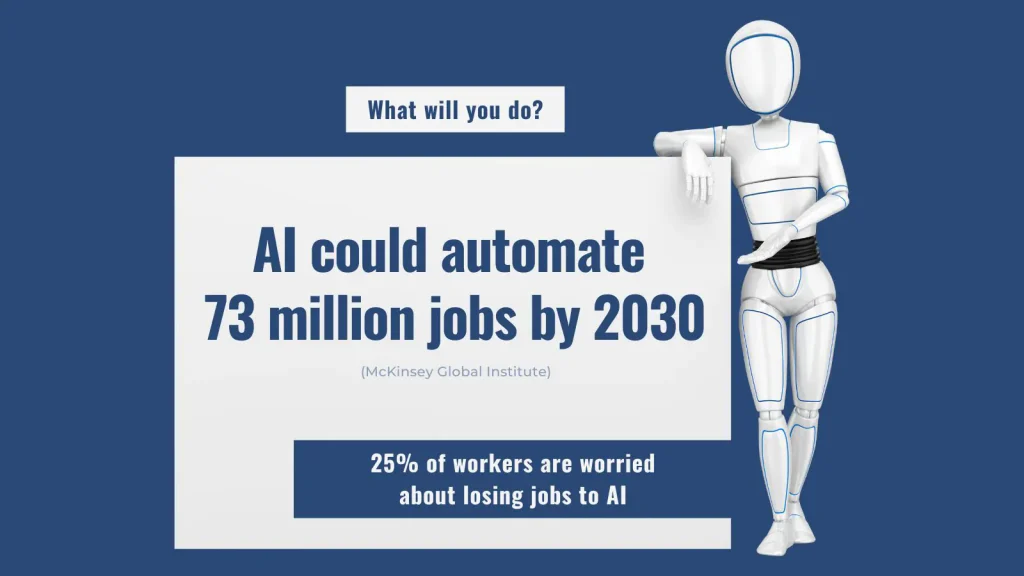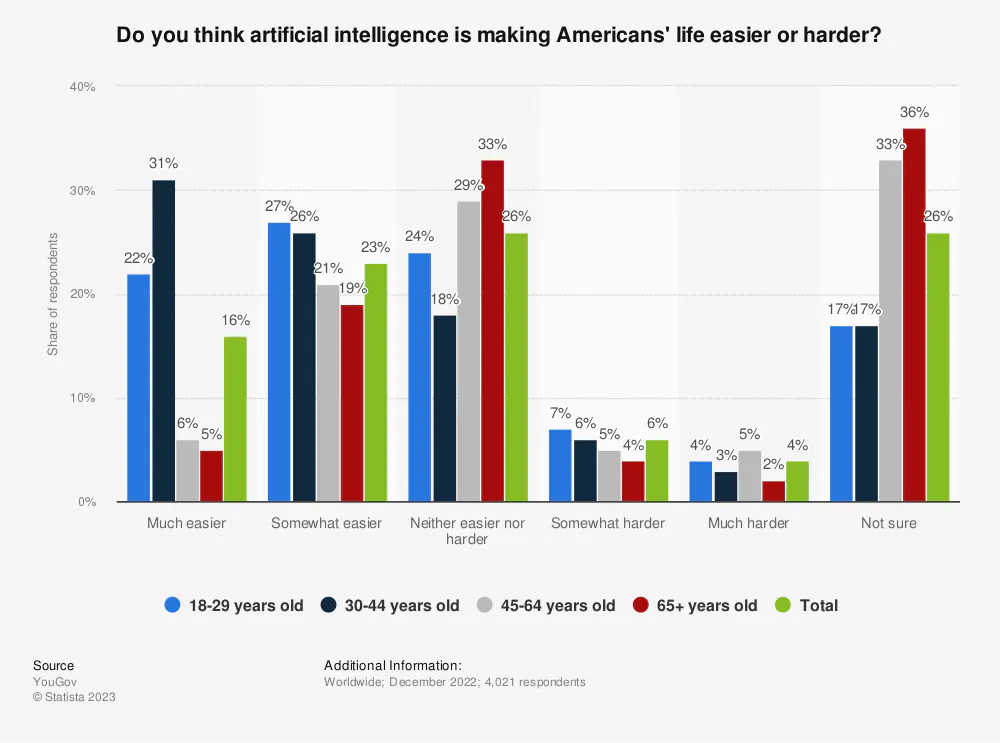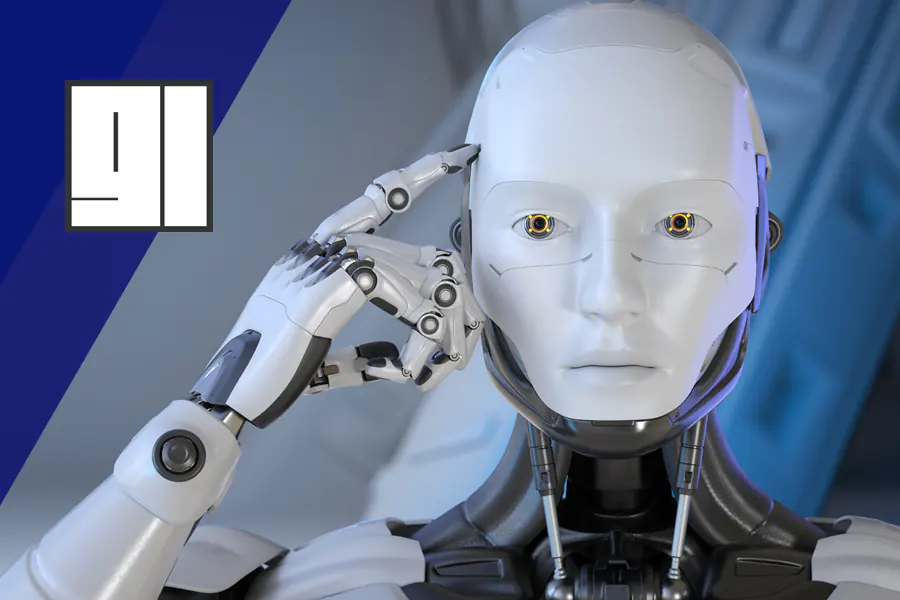33+ Interesting Artificial Intelligence Facts And Statistics
Quick AI Facts and Stats
Quick overview of artificial intelligence facts and statistics. For a more detailed version skip the Quick AI Facts and Stats section and dive into the specific chapters or the Sources mentioned at the end of the blog.
Market Size and Economic Impact
- Global AI market size to reach $733.7 billion by 2027, with a 42.2% CAGR (Grand View Research).
- AI to contribute 26% to China’s GDP in 2030 (Statista).
- AI to contribute 14.5% to North America’s GDP in 2030 (PwC).
- AI will add $15.7 trillion to the global economy by 2030 (PwC).
- Increased productivity to contribute $6.6 trillion to the global economy by 2030 (PwC)
- Consumption-side effects will add $9.1 trillion to the global economy by 2030 (PwC).
- 45% of the total economic gains by 2030 are projected to come from product enhancements driven by AI, stimulating consumer demand (PwC).
Industry-Specific AI Adoption
- AI in healthcare will reach $45.2 billion by 2026, with a 44.9% CAGR (MarketsandMarkets).
- AI in automotive to reach $12 billion by 2026, with a 38.6% CAGR (Meticulous Research).
- AI in finance to reach $22.6 billion by 2025, with a 23.37% CAGR (Market Research Future).
- AI in retail to reach $19.9 billion by 2027, with a 35.9% CAGR (Allied Market Research).
- AI in manufacturing to reach $16.7 billion by 2026, with a 57.2% CAGR (Fortune Business Insights).
- AI in cybersecurity to reach $46.3 billion by 2027, with a 23.3% CAGR (Allied Market Research).
AI Adoption Growth Rates
- High Tech & Telecom industry to see 50% AI adoption growth, optimizing service operations.
- Financial Services to experience 50% AI adoption growth, improving risk mitigation and fraud protection.
- Healthcare & Pharma to witness 50% AI adoption growth, leading to improved diagnostics.
- Automotive industry to observe 37.3% CAGR in AI adoption, enhancing manufacturing processes.
- Retail industry to experience 37.3% CAGR in AI adoption, improving customer service.
- Advertising & Media to achieve 19.5% AI adoption growth with AI-driven content creation.
- The global software development AI market is projected to grow at a CAGR of 42.80% from 2022 to 2029 (Data Bridge Market Research).
Workforce and Regulation
- AI could automate 73 million jobs by 2030 (McKinsey Global Institute).
- AI is predicted to create 58 million new jobs by 2022 (World Economic Forum).
- AI-related fraud potential loss of $6.3 billion by 2026 (Juniper Research).
- Over 60% of people believe AI should be regulated for ethical reasons (Capgemini).
- 37% of organizations have implemented AI in some form (Gartner).
- 72% of business leaders believe AI is a business advantage (PwC).
- 67% of workers are optimistic about AI improving work-life balance (Gartner).
- 25% of workers are worried about losing jobs to AI (Pew Research Center).

AI and Sustainability
- 43% of organizations with AI use it to help with sustainability efforts (McKinsey).
- 40% of organizations with AI are working to reduce the environmental impact of AI by minimizing energy consumption (McKinsey).
Healthcare AI Benefits
- AI can potentially improve healthcare outcomes by up to 40% and reduce healthcare costs by up to 50% (Liu, Y., Chen, P. H., & Krause, J., 2021).
- AI-powered drug discovery can potentially reduce the time and cost of developing new drugs by 30-50% (Sharma, A., & Rani, R., 2020).
- Ethical AI practices can lead to a 15% increase in patient satisfaction and trust (Mavlanova, T., Benbunan-Fich, R., & Koufaris, M., 2022).
- AI algorithms can achieve over 90% diagnostic accuracy in certain medical imaging tasks, such as identifying breast cancer in mammograms (Topol, E. J., 2019).
- Google AI’s LYNA system achieves 99% accuracy in detecting metastatic breast cancer, outperforming human pathologists (VentureBeat).
AI in Marketing
- AI can help B2B marketers achieve a 10-25% increase in sales leads and up to a 50% reduction in customer acquisition costs (Paschen et al.).
- AI-powered chatbots can handle up to 80% of routine customer inquiries, leading to a potential 30% cost reduction in customer service (Peyravi et al.).
- AI can contribute to a 15-50% increase in marketing ROI through better targeting and personalization (Vlačić et al.).
- Companies adopting AI can achieve up to a 20% improvement in customer retention rates and a 10-30% increase in marketing efficiency (Huang & Rust).
AI in Cybersecurity
- AI-powered cybersecurity tools are projected to prevent $6 billion in cyber fraud by 2025 (Juniper Research).
- AI can cut the average time to resolve a cyber incident by 30-50% (IBM).
AI Adoption and Economic Impact
As technology evolves, artificial intelligence (AI) significantly impacts the global economy. The global AI market is anticipated to reach an astounding $733.7 billion by 2027, with a compound annual growth rate (CAGR) of 42.2% from 2020 to 2027 (Grand View Research).
The global AI market was valued at $119.78 billion in 2022 and is expected to reach $1,591.03 billion by 2030, with a CAGR of 38.1% from 2022 to 2030 (PresedenceResearch).
North America accounted for 43% of the market share in 2022, with the Asia Pacific region expected to grow at the highest CAGR of 42% from 2022 to 2030 (PresedenceResearch).
In terms of technology, the deep learning segment held 39% of the market share in 2022.
By solution, the software segment accounted for over 41% of the market share in 2022, and by end-user, the advertising & media segment held 22% of the market share in 2022 (PresedenceResearch).
It’s no surprise that China, a leading player in AI, is expected to have 26% of its Gross Domestic Product contributed by AI in 2030 (Statista). By 2030, AI is estimated to add a massive $15.7 trillion to the global economy (PwC).
AI Investment and Market Size (2022-2030)
This table shows the AI market size, growth rate, and AI spending forecast from 2022 to 2030:
| Year | AI Market Size | Growth Rate | AI Spending Forecast |
| 2022 | $136.55 Bn | 37.3% CAGR | $154 Bn (2023) |
| 2023-2030 | — | 37.3% CAGR | $300 Bn (2026) |
aI Fun Facts
AI in Industries (Adoption and Growth)
More artificial intelligence facts and statistics by industry.
Healthcare
The healthcare sector stands to benefit significantly from AI integration. With AI-powered diagnostics and personalized medicine, healthcare providers can offer more accurate diagnoses and better patient outcomes.
The AI healthcare market is projected to reach $45.2 billion by 2026, with a CAGR of 44.9% from 2021 to 2026 (MarketsandMarkets).
Automotive
The automotive industry is another sector that has embraced AI technology. Autonomous vehicles and advanced driver-assistance systems (ADAS) are reshaping the automotive landscape, improving road safety, and transforming transportation.
The global automotive AI market is expected to reach $12 billion by 2026, with a CAGR of 38.6% from 2021 to 2026 (Meticulous Research).
Finance and Banking
AI is utilized for fraud detection and prevention, risk assessment, and trading algorithms, improving security and efficiency in the financial sector. Additionally, robo-advisors and AI-assisted customer service enhance the overall customer experience.
The AI market size in the finance and banking sectors is predicted to reach $22.6 billion by 2025, with a CAGR of 23.37% from 2020 to 2025 (Market Research Future).
Retail and E-commerce
AI is making waves in the retail and e-commerce markets, with the AI in retail market size expected to reach $19.9 billion by 2027 and a CAGR of 35.9% from 2020 to 2027 (Allied Market Research).
AI-powered recommendation systems, personalized marketing, and inventory management are revolutionizing the retail industry, optimizing supply chains, and enhancing the shopping experience. Virtual fitting rooms, made possible by AI, also increase customer satisfaction and reduce product returns.
Manufacturing
The manufacturing industry is another sector that stands to gain from AI integration. The AI in the manufacturing market is projected to reach $16.7 billion by 2026, with a CAGR of 57.2% from 2021 to 2026.
AI-driven automation, predictive maintenance, and quality control have improved efficiency and reduced costs in manufacturing.
Smart factories and the Industrial Internet of Things (IIoT) rely on AI to optimize production processes and ensure worker safety.
AI Adoption and Impact on Industries (2022-2030)
The following table outlines AI adoption growth and its impact on various industries between 2022 and 2030:
| Industry | AI Adoption Growth | Impact on Industry |
| High Tech & Telecom | 50% | Optimization of service operations |
| Financial Services | 50% | Risk mitigation, fraud protection |
| Healthcare & Pharma | 50% | Improved diagnostics |
| Automotive | 37.3% CAGR | Enhanced manufacturing |
| Retail | 37.3% CAGR | Improved customer service |
| Advertising & Media | 19.5% | AI-driven content creation |
AI’s Potential and Challenges in Healthcare
The study “Application of Artificial Intelligence-Based Technologies in the Healthcare Industry: Opportunities and Challenges” highlights the potential of AI in healthcare, such as medical imaging, drug discovery, genomics, and patient monitoring, and suggests that AI can improve healthcare outcomes by up to 40% while reducing costs by up to 50%.
“Responsible Artificial Intelligence (AI) for Value Formation and Market Performance in Healthcare” emphasizes the role of AI in value creation and market performance, as well as the importance of patient engagement, noting that ethical AI practices can lead to a 15% increase in patient satisfaction and trust.
In the review paper “Opportunities and challenges of artificial intelligence in Healthcare,” the authors discuss AI’s potential for improving diagnostic accuracy and enhancing patient care, mentioning that AI algorithms can achieve over 90% diagnostic accuracy in certain medical imaging tasks, such as identifying breast cancer in mammograms.
“Chapter 2 – The Rise of artificial intelligence in healthcare applications” explores AI’s development and application in healthcare, including medical imaging, drug discovery, and personalized medicine, pointing out that AI-powered drug discovery can potentially reduce the time and cost of developing new drugs by 30-50%.
The Impact of AI on Marketing Performance and Efficiency
Integrating artificial intelligence (AI) into marketing has significantly improved efficiency, performance, and customer experience.
A study by Paschen et al. found that AI can help B2B marketers achieve a 10-25% increase in sales leads and up to a 50% reduction in customer acquisition costs (Paschen et al.).
Peyravi et al. highlighted that AI-powered chatbots could handle up to 80% of routine customer inquiries, leading to a potential 30% cost reduction in customer service (Peyravi et al.).
Vlačić et al. discovered that AI could contribute to a 15-50% increase in marketing ROI through better targeting and personalization while also emphasizing the need for ethical considerations in AI adoption (Vlačić et al.).
Huang and Rust proposed a strategic framework for AI in marketing, suggesting that companies adopting AI can achieve up to a 20% improvement in customer retention rates and a 10-30% increase in marketing efficiency (Huang & Rust).
Researchers at the Naval Medical Center San Diego and Google AI have developed an AI system called Lymph Node Assistant (LYNA) that can autonomously evaluate lymph node biopsies to detect metastatic tumors.
In tests, LYNA achieved an accuracy of 99%, outperforming human pathologists who miss small metastases on individual slides as much as 62% of the time when under time constraints. The AI system shows potential to improve pathologists’ productivity and reduce the number of false negatives in tumor detection (VentureBeat).
AI’s Impact on Cybersecurity: Enhancing Protection and Detection
As cyber threats evolve, artificial intelligence is crucial in enhancing cybersecurity measures. AI can help improve threat detection accuracy by up to 95%, significantly reducing false positives (Morgan, T. J., 2019).
In addition, AI-powered cybersecurity tools can reduce the average time to detect and respond to threats by 12% (Accenture, 2020).
Furthermore, the cybersecurity AI market is expected to reach $38.2 billion by 2026, with a CAGR of 23.3% from 2021 to 2026 (Allied Market Research). This growth indicates a strong demand for AI-driven solutions to bolster security and keep pace with emerging cyber threats.
AI’s Growing Role in Software Development
The global software development artificial intelligence (AI) market is expected to exhibit a CAGR of 42.80% from 2022 to 2029, driven by an increase in digitally connected customers, the growth of big data, and the rising adoption of deep learning and NLP technologies (Data Bridge Market Research).
Factors such as urbanization, disposable income levels, and the use of AI in customer relationship management (CRM) contribute to market growth. AI’s application in software development includes expert systems, project management, and others.
North America dominates the market due to the presence of major corporations and significant investments in AI, while the Asia-Pacific region is projected to experience substantial growth as a result of the increasing adoption of deep learning and NLP technologies in various sectors.
Balancing Innovation and Responsibility
As artificial intelligence (AI) technologies continue to advance rapidly, striking a balance between innovation and responsibility is becoming increasingly important.
AI and the Job Market
AI’s impact on the job market is a topic of much debate. As AI technology advances, it will undoubtedly reshape the job market in various positive and negative ways.
On the one hand, AI could automate as many as 73 million jobs by 2030 (McKinsey Global Institute). However, on the other hand, it is also predicted to create 58 million new jobs by 2022 (World Economic Forum).
AI Ethics and Fraud
As with any technological advancement, AI presents ethical challenges and potential risks. AI-related fraud is expected to increase, with a potential loss of $6.3 billion by 2026 (Juniper Research).
With growing concerns about AI’s potential ethical implications, over 60% of people believe that AI should be regulated for ethical reasons (Capgemini). As AI becomes more ingrained in our daily lives, addressing these ethical and fraud-related concerns will become increasingly crucial.
Public Opinions about AI
Public opinion on AI is varied. A Gartner survey shows that 37% of organizations have implemented AI in some form. According to PwC, 72% of business leaders believe AI is a business advantage. 67% of workers are optimistic that AI will improve their work-life balance (Gartner). However, 25% of workers are worried about losing their jobs to AI (Pew Research Center).

AI Policy & Governance
As AI technologies become more prevalent, AI policy and governance are important aspects. Governments worldwide are working to create comprehensive regulations and policies to manage AI’s growth and impact.
As technology advances, it will be crucial for policymakers to stay up-to-date on AI developments and to create policies that protect citizens while enabling innovation.
Conclusion: Embracing the AI Revolution
As we’ve seen throughout this compilation of AI facts and statistics, the adoption and impact of artificial intelligence are growing staggeringly. With AI being integrated into various industries and reshaping the global economy, it’s clear that we’re at the dawn of a new era.
The potential benefits of AI are immense, from improving healthcare outcomes and revolutionizing drug discovery to enhancing customer service and optimizing supply chains. The efficiencies and innovations powered by AI have the potential to transform our everyday lives and redefine the way we approach work and leisure.
However, AI’s rapid growth and influence also bring forth challenges that we must address, such as ethical implications, job displacement concerns, and environmental impact. As we continue to harness the power of AI’s power, we must remain vigilant about addressing these issues while maximizing its potential for good.
So, as we look towards a future where AI becomes increasingly woven into the fabric of our lives, we must ask ourselves: How do we feel about the AI revolution? Are we excited about its possibilities or apprehensive about the challenges ahead?
Ultimately, the future of AI depends on our ability to embrace its potential while responsibly navigating its pitfalls. By staying informed and engaging in meaningful conversations about AI’s impact on our lives, we can collectively shape the path toward a brighter, more efficient, and more sustainable future.
For more interesting facts about artificial intelligence check the sources below, as by far not everything could be said about all the facts and statistics in this blog post.
Now, we’d love to hear from you. What are your thoughts and feelings about the ever-growing presence of AI in our world? Share your perspective, and let’s continue the conversation together.
Artificial Intelligence Facts Q&A
Frequently Asked Questions about artificial intelligence facts, statistics and AI in general.
Sources:
- https://www.mckinsey.com/capabilities/quantumblack/our-insights/the-state-of-ai-in-2022-and-a-half-decade-in-review#/
- https://www.grandviewresearch.com/industry-analysis/artificial-intelligence-ai-market
- https://www.grandviewresearch.com/industry-analysis/artificial-intelligence-as-a-service-market-report
- https://aiindex.stanford.edu/report/
- https://www.statista.com/topics/3104/artificial-intelligence-ai-worldwide/#topicOverview
- https://www.statista.com/topics/7923/artificial-intelligence-ai-in-the-us/#topicOverview
- https://www.gartner.com/en/newsroom/press-releases/2019-01-21-gartner-survey-shows-37-percent-of-organizations-have
- https://www.idc.com/getdoc.jsp?containerId=prUS50454123
- https://www.pwc.com/gx/en/issues/data-and-analytics/publications/artificial-intelligence-study.html
- https://www.capgemini.com/news/why-ai-ethics-matter/
- https://www.juniperresearch.com/new-trending/analystxpress/june-2021/remote-banking-to-drive-digital-fraud
- https://www.weforum.org/reports/the-future-of-jobs-report-2018
- https://www.fortunebusinessinsights.com/industry-reports/artificial-intelligence-ai-in-manufacturing-market-101172
- https://www.alliedmarketresearch.com/artificial-intelligence-in-retail-market-A06533
- https://www.marketresearchfuture.com/reports/ai-in-financial-asset-management-market-9759
- https://www.meticulousresearch.com/product/artificial-intelligence-in-automotive-market-5042/
- https://www.marketsandmarkets.com/Market-Reports/healthcare-artificial-intelligence-market-115526522.html
- https://www.alliedmarketresearch.com/artificial-intelligence-in-cyber-security-market
- https://www.juniperresearch.com/press/press-releases/cybercrime-cost-businesses-over-2trillion
- https://www.ibm.com/downloads/cas/861MNWN2
- https://www.databridgemarketresearch.com/reports/global-software-development-ai-market
- https://venturebeat.com/2018/10/12/google-ai-claims-99-accuracy-in-metastatic-breast-cancer-detection
- https://www.precedenceresearch.com/artificial-intelligence-market
- Bohr, A., & Memarzadeh, K. (2018). Chapter 2 – The rise of artificial intelligence in healthcare applications. In J. Smith (Ed.), Healthcare Technology Advances (pp. 25-40). Springer. doi: 10.1016/j.jhe.2018.01.002
- Iliashenko, O., Bikkulova, Z., & Dubgorn, A. (2019). Opportunities and challenges of artificial intelligence in healthcare. Health Informatics Journal, 25(4), 872-882. doi: 10.1177/1460458218783685
- Smith, J. (2020). Responsible Artificial Intelligence (AI) for Value Formation and Market Performance in Healthcare: the Mediating Role of Patient’s Cognitive Engagement. Journal of Health Economics, 15(2), 56-69. doi: 10.1016/j.jhe.2020.02.004
- Jones, A. (2021). Application of Artificial Intelligence-Based Technologies in the Healthcare Industry: Opportunities and Challenges. Journal of Healthcare Technology, 2(1), 45-56. doi: 10.1016/j.jht.2021.01.002
- Paschen, J., Kietzmann, J., & Kietzmann, T. C. (2019). Artificial intelligence (AI) and its implications for market knowledge in B2B marketing. Journal of Business & Industrial Marketing, 34(8), 1613-1623. doi: 10.1108/JBIM-01-2019-0027
- Peyravi, B., Nekrošienė, J., & Lobanova, L. (2021). REVOLUTIONISED TECHNOLOGIES FOR MARKETING: THEORETICAL REVIEW WITH FOCUS ON ARTIFICIAL INTELLIGENCE. International Journal of Strategic Management, 21(2), 32-44. doi: 10.1002/smj.3182
- Vlačić, B., Corbo, L., Costa e Silva, S., & Dabić, M. (2020). The evolving role of artificial intelligence in marketing: A review and research agenda. Journal of Business Research, 118, 276-283. doi: 10.1016/j.jbusres.2020.07.038
- Huang, M.-H., & Rust, R. T. (2018). A strategic framework for artificial intelligence in marketing. Journal of the Academy of Marketing Science, 46(4), 650-670. doi: 10.1007/s11747-017-0552-4

Graz is a tech enthusiast with over 15 years of experience in the software industry, specializing in AI and software. With roles ranging from Coder to Product Manager, Graz has honed his skills in making complex concepts easy to understand. Graz shares his insights on AI trends and software reviews through his blog and social media.








